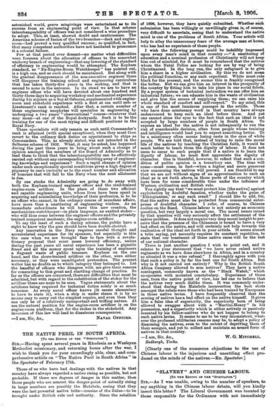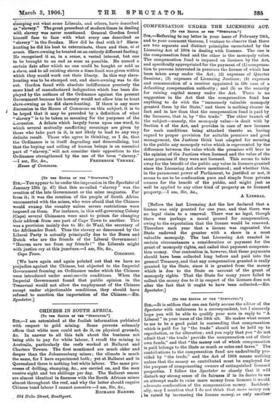" SLAVERY " AND CHINESE LABOUR. (TO THE EDITOR 07
THE ..spacrArori.1 SIE,—As I was unable, owing to the number of speakers, to say anything in the Chinese labour debate, will you kindly insert this letter P The Liberal Government was taunted by those responsible for the Ordinance with not immediately stamping out what some Liberals, and others, have described as "slavery." The great precedent of modern times in dealing with slavery was never mentioned. General Gordon found himself face to face with what every one described as "slavery" in the Soudan. How did be deal with it? Slave- hunting he did his best to exterminate, there and then, in: et armis. Slave-owning he treated on an entirely different footing. He recognised it as, in a sense, a vested interest, but one to be brought to an end as soon as possible. He named a certain date after which no one could be bought or sold as a slave, and to all existing slaves a time-limit was given within which they would work out their liberty. In this way slave- hunting was to be stamped out, and slave-owning was to die out. Gordon faced with absolute indifference precisely the same kind of manufactured indignation which has been dis- played by the authors of the Ordinance against the present Government because his honesty would not allow him to treat slave-owning as he did slave-hunting. If there is any more discussion in the House of Commons on this subject, it is to be hoped that it may be preceded by a definition of what " slavery" is to be taken as meaning for the purposes of the Lacussion. A debate which largely turns upon one word, to which several mutually conflicting meanings are given by those who take part in it, is not likely to lead to any very definite result. Those who agree in thinking, as I do, that the Ordinance is in itself degrading and demoralising, but that the buying and selling of human beings is an essential part of "slavery," will not consider their opposition to the Ordinance strengthened by the use of the term "slavery."
House of Commons.















































 Previous page
Previous page